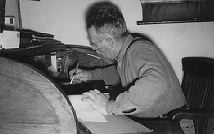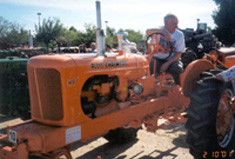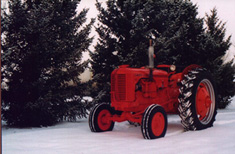The Snyder Farm, where Dad moved his family in 1939, was a disaster. 
Swamps full of mud hens and snapping turtles, fences falling down and losing money. Dad and Brother Jim drained the swamp, built many miles of "hog-tight" fence, introduced crop rotation and innovations like hybrid corn and fertilizer, painted the barn and earned a profit.
Sand hills raise sandburs better than corn -- or any crop. Grain grown was processed through hogs which got sold as prospective bacon, pork chops and ham and processed through cows from whom we got and sold milk but ended up as hamburger when they failed produce enough salable milk to pay their room and board. Chickens in abundance and sometimes the neighbor's Guinea Hens wandered up the lane looking for a treat.

Dad working on the Books -- Casey
Casey appeared in 1949. This little tractor, for all practical purposes was mine, since I was the primary pilot. Casey could pull the water wagon, a load of grain or hay or a light field tool.Pulling wagons was good preparation for life as it was an important and demanding job. I had to pay attention to details and couldn't quit until Dad said we were done for the day.
That little tractor could fly. I flew it to exotic places all over this planet and followed Captain Video to the moon.
Cutting silage was a wonderful time of good country perfume and adventure. As Dad was cutting the last of a field of standing corn I would jump down and chase rabbits that tried to hide in the grass that remained uncut -- actually caught several rabbits with my own hands.


Into the soup to shovel manure -- I'm sure there are laws against working people in conditions like that today and then there were the hours. Cows have to be milked at least twice a day -- 12 hours apart -- so the milkier milks from 4:30 to 6:30 a.m. and again from 4:30 to 6:30 p.m. -- and puts in a solid day of other work in between milkings. We lived our hours and working conditions because we didn't know any better.
Work didn't seem to hurt us too much and there were advantages to life on the farm. When many people were hungry we always had plenty of good food. I can remember complaining because all we had to eat was steak, pork, fresh vegetables and homemade bread. We were even forced to drink milk at every meal.
But most dear to my little boy heart was being allowed to wallow with impunity in the mud. I built lots of miniature mud forts -- an entire mud country with flowing rivers and lakes and a complete paper airplane air force more than once.
Chickens taught Carolyn and me to save. In 1951 Dad bought us 100 baby Leghorn Chickens which we raised and from which we gathered and sold eggs for a year. The outcome was $117 which Carolyn and I used to buy a new Motorola Television set. Carolyn and I never did realize that all $117 wasn't pure profit -- that Dad built the chicken house, paid for the chickens and chicken feed.
Raising crops, cows, chickens and pigs was a vicious circle. The livestock produced tons of manure we spread on the fields making them more fertile which increased the yield of hay and grain making it possible to feed and keep more livestock which produced even more manure.
Actually, playing in the mud was comparatively clean fun. My amazement the day I invented a grease gun out of a tin can and a stick and could squirt grease just like a hardware store bought grease gun. I greased everything that would stand for it -- I bet there's still dried grease on gate hinges and elsewhere. Mom closed that store the day I used an oil can to lubricate Sister Ruth's hair.
Farm life was also good for the soul. Each member of my Family was a valued worker. Care of the young stock and chickens were always my responsibilities even on Sunday and Christmas. I rebelled once -- refused to take care of the chickens one night after school. My shame at seeing Dad do my job after a long day's work was too much and I never failed to carry my load again.
About 1995 I was saddened to see that the barn we painted and made look like new was weather-beaten and falling down and the shining galvanized steel tool shed was almost rusted away. All was gone just two years later.
